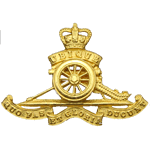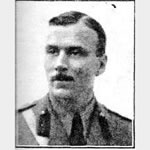Commemorated: | |||
| 1. Grave: | Baghdad (North Gate) War Cemetery | X. E. 14. | |
| 2. Book: | The (1921) Masonic Roll of Honour 1914-1918 | Pg.128 | |
Awards & Titles: | Distinguished Service Order & Bar Mentioned in Despatches Queen's South Africa Medal - 3 Clasps Khedive's Sudan Medal (1896-1908) Order of St. Anne, 3rd Class, with Swords | ||
Family :
Son of George Staunton Lynch-Staunton, J.P., and Margaret Hasler Lynch-Staunton, of Purbrook, Hampshire.Education & Career :
He was educated at Cheltenham College.
Probate
LYNCH-STAUNTON Reginald Kirkpatrick of Purbrook House Purbrook Hampshire died 7 November 1918 at Bagdad Probate London 1 April to Gertrude Margaret Lynch-Staunton spinster. Effects £3931 14s. 10d.
Service Life:
Campaigns:
- The Second Anglo-Boer War 1899-1902, South Africa.
- The First World War 1914-1918, World-wide.
| Unit / Ship / Est.: 220th Brigade H.Q. RFA |
| Action : Mesopotamia |
At the outbreak of war the British, together with Indian troops, resolved to protect oil supply in the region by occupying the area around Basra at Abadan. This evolved into a series of campaigns towards Baghdad against the Turkish forces as Mesopotamia (modern Iraq) was part of the Ottoman Empire. Meetings in late 1914 and into 1915 led the Viceroy and Indian government at Simla to reconsider the limited involvement of troops and they decided to order further advances with a view to securing the Shatt-al-Hai, a canal connecting the Tigris and Euphrates river and potentially capturing Baghdad. The British government disagreed and wished to conserve forces for the Western front. The Viceroy was given permission to act as it wished, but told in no uncertain terms that no reinforcements should be expected.
The initial success experienced by the British and Indian forces quickly disintegrated in the face of Ottoman opposition. The Siege of Kut-Al-Amara began on 7th December with the besieging of an 8,000 strong British-Indian garrison in the town of Kut, 100 miles south of Baghdad, by the Ottoman Army. These campaigns produced few tactical benefits, indeed the catastrophic defeat at Kut in 1916 was a major setback. Badhdad was eventually taken in March 1917.
The conditions in Mesopotamia were dreadful. The climate, sickness and disease produced large losses in addition to battle casualties. About as many men died of disease as were killed in action. The Mesopotamia front was part of a strategy hoping for success at lower cost than the Western Front but no decisive victory was achieved.
He served in the South African War in 1900, and received the Queen's Medal with three clasps. He became Lieutenant 16 Feb. 1901; was attached to the Royal Horse Artillery from 1903 to 1907, and was promoted to Captain 14 Oct. 1907.
From 1907 to 1911 he was employed with the Egyptian Army, and was in command of an Egyptian Battery, taking part in operations in Southern Kordofan (Medal with clasp). From 1912 to 1914 he commanded U Battery, Royal Horse Artillery.
He was subsequently Adjutant, R.H.A. Brigade, Meerut, and in 1914 was Secretary to the Meerut Tent Club.
On the outbreak of the European War Major Lynch-Staunton mobilized as Second-in-Command, ILA., 7th (Meerut) Division, R.A. 11 Aug. 1914, and accompanied the Division to France in Oct. 1915, as Brigade Major.
He was mentioned in Despatches and created a Companion of the Distinguished Service Order [London Gazette, 23 June, 1915];
"Reginald Kirkpatrick Lynch-Staunton, Major, Royal Artillery. For distinguished service in the field"
He left France in Dec. 1915, for Mesopotamia, and served as Brigade Major, R.A., Tigris Corps, until 15 Aug. 1916.
He was slightly wounded 7 Jan. 1916, but was able to take part the same month in operations at Hanneh, and Sanniyat, etc., in March and April, 1916.
He was Acting Lieutenant-Colonel from 16 Aug. 1916, commanding the 13th Brigade, R.F.A., and commanded this Brigade during the operations of Dec. 1916, on the Hai, the Shumrar crossing, in the advance and capture of Baghdad, also in operations on the Dialah River and River Adheim, April, 1917.
He was given the Brevet of Lieutenant-Colonel 3 June, 1916 [London Gazette, 22 Dec. 1916], and in 1917 was awarded the Order of St. Anne, 3rd Class, with Swords.
Detail :
He died on 7 November of wounds received 26th October in Baghdad at age 38.
Masonic :
| Type | Lodge Name and No. | Province/District : |
|---|---|---|
| Mother : | Ubique No. 1789 E.C. | London |
| Joined : | Khartoum No. 2877 E.C. | Egypt |
| Joined : | Hope No. 413 E.C. | Bengal |
Initiated | Passed | Raised |
11th November 1901 | 10th February 1902 | 12th April 1902 |
Initiated into Ubique Lodge in 1901 at Woolwich; listed as Lieutenant. He was raised in Aldershot Army & Navy Lodge No. 1971. The contribution record shows "died of wounds 20 Oct 1918." He further joined Khartoum Lodge No. 2877 4th November 1909 and also Lodge of Hope No. 413 on 4th April 1914.
Source :
The project globally acknowledges the following as sources of information for research across the whole database:
- The Commonwealth War Graves Commission
- The (UK) National Archives
- Ancestry.co.uk - Genealogy, Family Trees & Family History online
- ugle.org.uk - The records of the United Grand Lodge of England including the Library and Museum of Freemasonry
Additional Source:
- Founder Researchers : Paul Masters & Mike McCarthy
- Researcher : Bruce Littley

